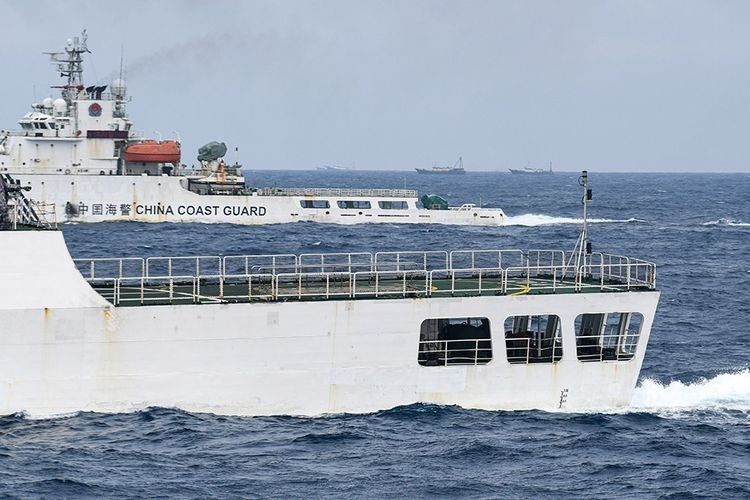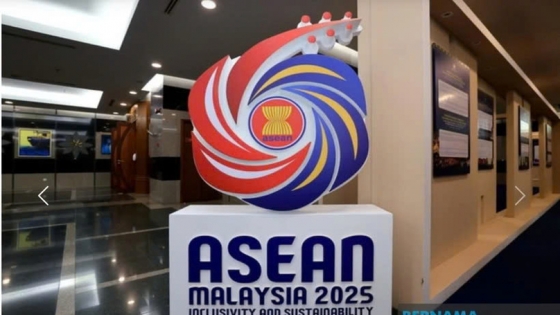Headline: Indonesian Maritime Agency Drives Off Unauthorized Chinese Vessel in North Natuna Sea
Indonesian Maritime Security Agency Responds to Foreign Intrusion in EEZ
In a significant maritime incident on Monday, the Indonesian Maritime Security Agency (Bakamla) successfully repelled a Chinese Coast Guard vessel that had entered Indonesia’s exclusive economic zone (EEZ) in the North Natuna Sea. The unauthorized incursion disrupted seismic survey operations by PT Pertamina East Natuna, carried out aboard the MV Geo Coral. This action underscores the growing tensions in regional waters concerning sovereignty and maritime rights.
Details of the Incident
On the morning of October 23, 2023, Bakamla’s command and control center received alerts about disturbances to the MV Geo Coral, which was conducting critical seismic surveys in its designated work area within Indonesia’s continental shelf. This response initiated a coordinated effort to address the unauthorized presence of the Chinese Coast Guard (CCG) vessel 5402.
What Happened?
At approximately 5:30 a.m., the Bakamla patrol ship KN Tanjung Datu-301 arrived on-site to encounter the CCG 5402. The engagement began with an attempt to establish communication with the Chinese vessel, which, according to Bakamla, made claims that the area in question fell under China’s jurisdiction. This assertion was met with concern, as it contradicts Indonesia’s sovereignty over its maritime zones.
Assistance and Escalation
To bolster its efforts, the KN Tanjung Datu 301 called for reinforcements, including the Navy patrol ship KRI Sutedi Senaputera 378 and a Bakamla maritime patrol aircraft. This multi-agency coalition worked collaboratively to ensure that Indonesia’s maritime laws were upheld. By leveraging both maritime and aerial assets, the enforcement team successfully pressured the CCG vessel out of Indonesian waters.
Historical Context and Regional Implications
The incident is part of an ongoing series of confrontations between Chinese vessels and Southeast Asian nations in the contested waters of the South China Sea. Indonesia, while not a claimant in the territorial disputes negotiated largely between China and its Southeast Asian neighbors, asserts rights over its EEZ, particularly in resource-rich areas like the North Natuna Sea.
Experts advocate for a unified regional approach in safeguarding maritime rights, recognizing that tensions in these waters could destabilize trade routes and impact local fishing communities. As highlighted in a statement from Bakamla: "Maintaining maritime sovereignty is vital for Indonesia’s security and economic stability."
The Economic Impact on Local Industries
The seismic survey activities being conducted by PT Pertamina East Natuna are critical for assessing potential energy resources beneath the North Natuna Sea. Delays or disruptions caused by foreign incursions can affect investment in the region and hinder Indonesia’s energy independence.
Moreover, these maritime altercations may deter international investors who seek stable operational environments. Striking a balance between sovereignty and regional cooperation is essential for Indonesia to foster growth in its maritime and energy sectors.
Looking Ahead: A Call for Vigilance
As regional tensions persist, the Indonesian government is urged to enhance its maritime surveillance capabilities and maintain open lines of communication with neighboring countries. Experts suggest that building stronger alliances through joint maritime exercises and information-sharing networks could deter future incursions.
Community Voices
Local fishermen and maritime stakeholders have expressed their concerns over the escalating situations at sea, advocating for increased protective measures. "Our livelihoods depend on these waters; we must safeguard our rights and resources," commented a representative from the Fishermen’s Association of Riau Islands.
Reader Engagement
Fortunately, the swift actions by Bakamla demonstrate Indonesia’s commitment to protecting its maritime interests. This incident reinforces the importance of vigilance in maritime security and heightened awareness among coastal communities about their rights and the necessary protocols to follow in similar situations.
Your thoughts on Indonesia’s maritime security measures are valuable to us. How do you perceive the impact of these events on the broader Southeast Asian maritime dynamics? Share your perspectives in the comments below!
For more insights into maritime security and regional affairs, be sure to check out our related articles on maritime sovereignty challenges, Indonesia’s energy initiatives, and regional collaboration in the South China Sea.
By staying informed, we can better understand the complexities of maritime governance and help foster a more secure and stable future for all parties involved.

